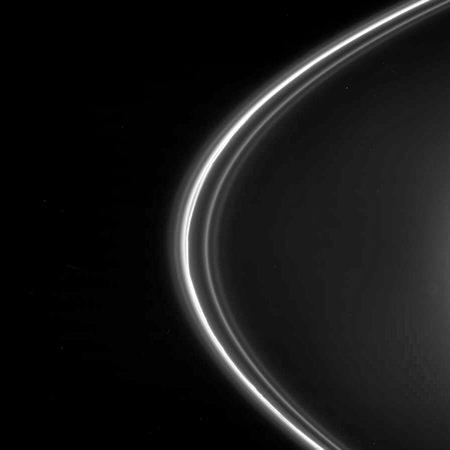Can there be a moon within a planetary ring?
A simple question, could a moon exist and stay whole if it was inside the ring of asteroids orbiting a planet? And as a side note, would it create a kind of bulge in the ring where the asteroids surround the moon? Honestly, this is entirely because my friend wants our planet to be uniquely pretty and I personally don't think this would work.
This post was sourced from https://worldbuilding.stackexchange.com/q/46636. It is licensed under CC BY-SA 3.0.
2 answers
You are accessing this answer with a direct link, so it's being shown above all other answers regardless of its score. You can return to the normal view.
Ever heard of shepherd moons? Shepherd moons are moons (typically not very massive) that orbit in the middle of planetary rings, creating gaps in the material. They also keep the ring material where it is, rather than letting it dissipate:

Image courtesy of Wikipedia user The Viewer under the Creative Commons Attribution 3.0 Unported license.
Examples of shepherd moons include:
- Prometheus
- Janus
- Epimetheus
- Metis
- Adrastea
- Pan
- Cordelia
- Ophelia
- Galatea
The list in the Solar System goes on.
See this video (which vanillagod beat me to) of Prometheus (right) and Pandora (left) orbiting Saturn by its F ring:
The rings extend beyond the edges of the image; these gaps are relatively small.
0 comment threads
Yes, you absolutely can have a moon orbiting within a ring system. In fact, we have a perfect example of that in our own solar system: Saturn's A ring has the Encke and Keeler gaps, wherein orbits the moons Pan and Daphnis, respectively.
So if you want a ring system with moons orbiting within it, go ahead. If you want to make it realistic, just make sure to have the moons clear out sufficient elbow room for themselves, which will create a corridor wider than the moon(s)' diameter.
For comparison, the Encke gap is 325 km wide with Pan having a mean radius of 14.1 ± 1.3 km (thus mean diameter 28.2 ± 2.6 km) and the Keeler gap is 42 km wide with Daphnis having a diameter of approximately 8 km. It thus seems reasonable for such a moon to clear out a corridor with a width about 5-10 times the moon's diameter in the ring system. When viewed from some angle other than straight on, for any reasonably sized moon, this gap will be readily visible.
And because pictures get everyone's attention, even though it's small, here's a side view of Pan, courtesy NASA by way of Wikipedia:

and Daphnis from either above or below (hard to tell):

Particularly in the context of the picture of Pan, it's worth keeping in mind that the rings of Saturn are less than 1 km thick.





















0 comment threads